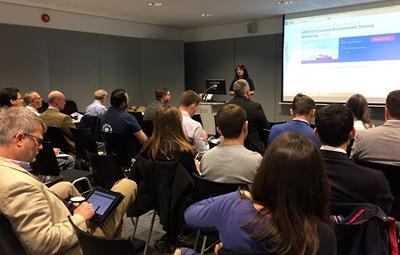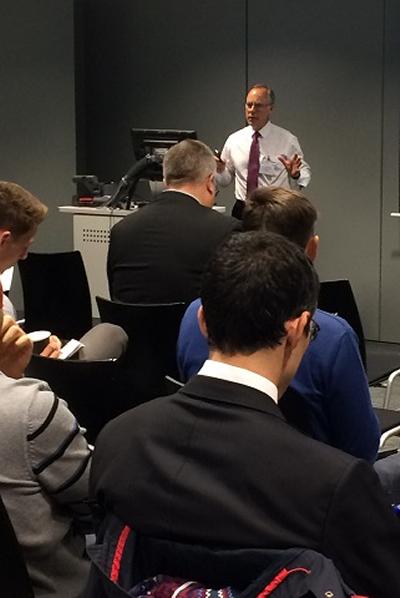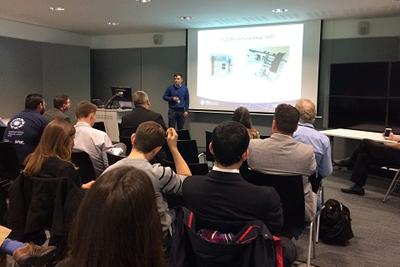Extreme Environment Sensing in focus at MENSUS research and industry networking event

Areas of mutual interest were identified as an attentive audience heard a range of talks from industry and academic speakers.
After the talks there was a break for lunch and networking following which groups were set up to discuss particular topics. The self-grouped discussion session separated the attendees into ocean monitoring and helicopter/aerospace monitoring based on individual interests. The main discussions are summarised below.
The Ocean Monitoring group:-
Persistent presence issues:-
- Longevity: maintaining performance, drift, fouling, power especially low-power requirements
- Taxi/platform/networks/cost: delivering sensor to location, sensing networks, ease of use and person costs, leave sensor in situ, multiple sensors, replace ship (safety, replace capability and new operations/methods); also related to automation (ATR), visual inspection, chemistry/biology
- Data: integration/interoperability, real time, latency, quality vs. or in addition to spread
Stakeholders:
- Aligning on common problems:-
- Oil & gas, renewables, science, mining
- Key issues – Need or solution led: nested surveys, regulatory; cost/ops/optimisatio
Risk based approach (Key projects)
- Numeric estimates
- Operational research
- Design (automation and decision support)
Constraints: data link
Discussion point: ATI for the oceans?
MENSUS:
- Outreach
- Recruitment pipeline
- CDT and industrial studentship


The speakers for the day were:
Alan Daniel (Leonardo): ‘Challenges faced by Leonardo in extreme environments - an overview’
Dr Alberto Sposito (Oxsensis): ‘Optical sensors for the aerospace industry'
Professor Jane Hart (Faculty of Social Human and Mathematical Science, University of Southampton) 'Mountain Sensing'
Professor Matt Mowlem (Head of Ocean Technology and Engineering, NOCS) title tbc
Dr Christopher Holmes (Faculty of Physical Sciences and Engineering, University of Southampton): 'Distributed Optical Sensors’
Professor Jorge Fliege (Faculty of Social, Human and Mathematical Sciences, University of Southampton): 'Sensing and big data’
Geraint West (Sonardyne): 'The challenges of deep ocean data'
The Helicopter/Aerospace Monitoring group
Key interests:-
What to capture, and effectively use, of
- Resource management
- Decision making
- Knowledge extraction
- Improving operational management – key area!
Key issues:-
- Foot print, legacy and hardware: interface/incorporation
- Cost effective
- R & D culture: risk attitude, regulation, maintenance
- Reliability and robustness
- Physical damage, strain, temperature for rotating machinery
- Validation and traceability
- Maintenance
Hot research:-
- Inverse methods
- Data/sensor fusion
- Improving operational management